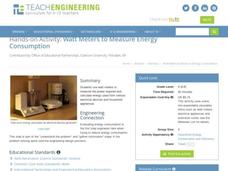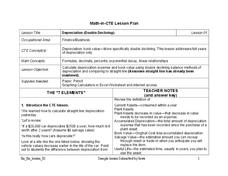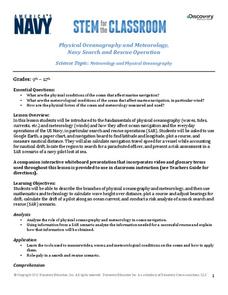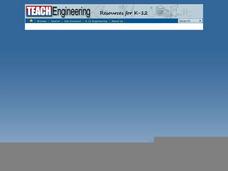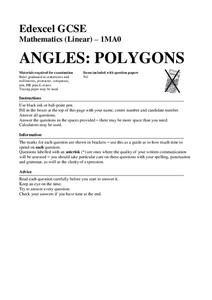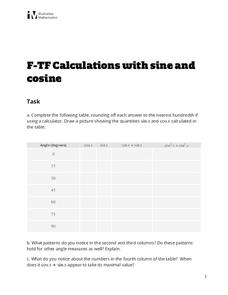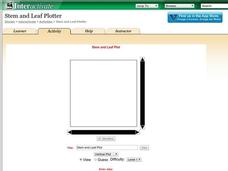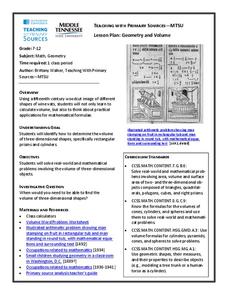Curated OER
Math Can Be Electrifying
Students explore how math can be used to calculate and analyze how electricity causes air pollution. Students design a campaign to educate family members on ways they can save electricity. They create a graph that compares two electric...
Teach Engineering
Watt Meters to Measure Energy Consumption
It used watt amount of energy? This resource investigates the power usage of small household appliances. Using a watt meter, groups measure the actual wattage used by an appliance and then calculate the energy used daily.
NASA
Launch Altitude Tracker
Using PVC pipe and aquarium tubing, build an altitude tracker. Pupils then use the altitude tracker, along with a tangent table, to calculate the altitude of a launched rocket using the included data collection sheet.
National Research Center for Career and Technical Education
Depreciation (Double Declining)
Have you ever been told that your new car begins to lose its value as soon as you drive it off the lot? Aspiring accountants take on the concepts of depreciation and book value through an easy-to-deliver career and technology lesson. The...
Olathe Public Schools
Forces, Net Forces & Acceleration
Pass along the knowledge of the great Sir Isaac Newton with this worksheet on the laws of motion. Including three separate problems, each involving multiple parts and calculations, this resource is a great way to...
Discovery Education
Physical Oceanography and Meteorology, Navy Search and Rescue Operation
It's an ocean rescue mission! Groups must find a pilot downed off the coast of the Chesapeake Bay. Rescuers must determine the distance needed to travel as well as the heading to get to the pilot's last known position. Taking...
Teach Engineering
Flame Test: Red, Green, Blue, Violet?
Let the true colors shine through. Pupils conduct a flame test to identify an unknown element. Class members calculate and prepare specific molarity solutions of three chemicals. Using their observations of the colors emitted, they...
Royal Society of Chemistry
Concentration of Solutions 1
Need a fun solution to teaching ... solutions? A series of puzzles provides reinforcement to key molarity terms and calculations. Science scholars determine the concentration of several solutions before using the information to solve...
Teach Engineering
Both Fields at Once?
An MRI uses both a magnetic and electricity, so how do the two interact with each other? Class members observe the effects on a charged particle when it is subject to both an electrical and magnetic field. The teacher background...
Teach Engineering
Efficiency of a Water Heating System
Tired of waiting for hot water? Groups of three determine the efficiency of an electric water-heating device. They calculate the amount of energy it takes to heat the water and the theoretical amount of energy required to heat the water....
Mathed Up!
Angles in Polygons
Show your class that finding angle measures is a regular calculation with a resource that provides 12 problems dealing with the measures of angles in regular polygons. Pupils use formulas for the sum of measures of angles in a polygon to...
Royal Society of Chemistry
pH 2: Activity
Pupils puzzled over pH? Incorporate an interactive resource that teaches through games! Chemistry scholars use reasoning to solve puzzles that focus on determining the pH based upon hydrogen ion concentration.
Mathematics Vision Project
Module 1: Getting Ready Module
This fabulous resource is a must-have for any algebra teacher's arsenal of lessons. Developing the idea of equations and use of variables from basic physical scenarios, learners gain valuable intuition in the structure and meaning of...
EngageNY
Modeling Riverbeds with Polynomials (part 1)
Many things in life take the shape of a polynomial curve. Learners design a polynomial function to model a riverbed. Using different strategies, they find the flow rate through the river.
Bowland
Speedy Santa
Santa sure is fast. In the assessment task, learners calculate the number of minutes Santa can spend at each house. This calculation requires the use of given population demographics data.
Firelands Local Schools
Exponential Growth and Decay
How can you safely model exponential growth and decay? A hands-on activity uses candies to model not only exponential decay, but also exponential growth. Exponential equations are fitted by hand and by use of a calculator...
Illustrative Mathematics
Calculations with Sine and Cosine
Practice makes perfect and perfecting those trigonometric functions are vital in trigonometry. The task requires evaluating cosine and sine values at common degree measures before looking at the results. Is there a pattern when the...
EngageNY
Normal Distributions (part 1)
Don't allow your pupils to become outliers! As learners examine normal distributions by calculating z-scores, they compare outcomes by analyzing the z-scores for each.
EngageNY
Chance Experiments with Outcomes That Are Not Equally Likely
The fifth portion of the 25-part series introduces probabilities calculated from outcomes that are not equally likely. Class members use tables to calculate probabilities of events, add outcome's probabilities, and find...
Shodor Education Foundation
Stem and Leaf Plotter
The key is in the leaves. Pupils enter data to create a stem-and-leaf plot. The resource then displays the plot and calculates the mean, median, and mode of the data. Using the plot and the calculated measures of spread, learners analyze...
Virginia Department of Education
Geometry and Volume
The history of math is fascinating! Utilize a woodcut primary source image from 1492 and posters from the 1930s to help geometers apply their volume-calculation skills to real-life questions.
Illustrative Mathematics
How Thick Is a Soda Can I?
The humble soda can gets the geometric treatment in an activity that links math and science calculations. After a few basic assumptions are made and discussed, surface area calculations combine with density information to develop an...
University of Adeaide
Basic Trigonometry and Radians
A fabulous set of examples and problems that introduce basic trigonometry concepts, this packet is set apart by the care it takes to integrate both radians and degrees into the material. After defining radians, the author demonstrates...
Teach Engineering
Energy and the Pogo Stick
Let your class bounce to examine the concept elastic potential energy. Individuals bounce on a pogo stick in order to calculate its elastic potential energy. Groups then compare the elastic potential energy to the gravitational...
Other popular searches
- Division Using a Calculator
- Math Using a Calculator
- Money Using a Calculator
- Graphing Using a Calculator
- Exponents Using Calculators
- Math Using Calculators
- Using a Calculator/an
- Practice Using Calculators



